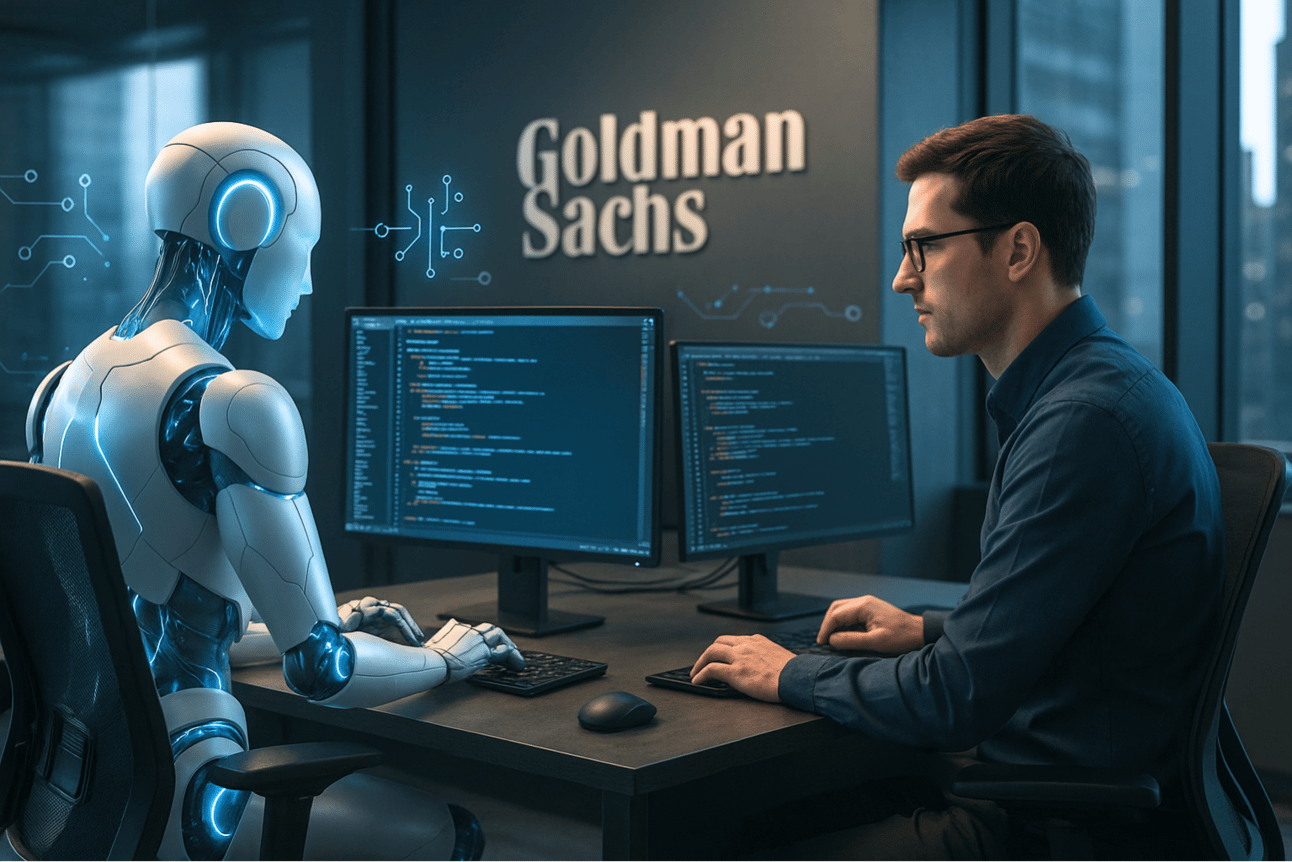
Image Source: ChatGPT-4o
Goldman Sachs Tests Autonomous AI Coder in Wall Street First
Key Takeaways:
Goldman Sachs is testing Devin, an autonomous AI software engineer built by startup Cognition, with plans to scale deployment.
The AI tool can perform full-stack engineering tasks and may replace repetitive work currently done by Goldman’s 12,000 developers.
Goldman could deploy hundreds to thousands of Devin instances depending on use case needs.
The move signals a major shift toward agentic AI that executes tasks, not just assists with them.
Cognition, backed by Peter Thiel and Joe Lonsdale, is now valued at nearly $4 billion.
Goldman Sachs Begins Piloting AI Software Engineer Devin
Goldman Sachs is testing Devin, an autonomous software engineer created by AI startup Cognition, as the investment bank explores using artificial intelligence to directly perform engineering work alongside its 12,000 human developers.
In an interview with CNBC, Goldman Sachs Chief Information Officer Marco Argenti said the company plans to gradually expand Devin’s presence inside the firm.
“We’re going to start augmenting our workforce with Devin, which is going to be like our new employee who’s going to start doing stuff on the behalf of our developers,” Argenti said.
A First for Wall Street
Goldman Sachs is the first major bank to test Cognition’s AI engineer, according to the company. The move is seen as a major milestone in the growing corporate adoption of agentic AI—a category of artificial intelligence that goes beyond document summarization or autocomplete and can complete multi-step tasks such as building full applications.
Devin first gained attention in 2023 when Cognition claimed it had built the world’s first AI software engineer. Demonstration videos showed the AI performing end-to-end development tasks with minimal human intervention.
“Initially, we will have hundreds of Devins, [and] that might go into the thousands, depending on the use cases,” Argenti said.
Reinventing the Engineering Workforce
The bank envisions Devin as a kind of digital teammate—not a replacement for engineers, but a force multiplier. According to Argenti, the AI agent will handle engineering tasks often viewed as tedious, such as updating legacy code to newer languages.
Goldman believes tools like Devin could boost productivity three to four times compared to previous-generation AI systems.
“It’s really about people and AIs working side by side,” Argenti said. “Engineers are going to be expected to have the ability to really describe problems in a coherent way and turn it into prompts … and then be able to supervise the work of those agents.”
Argenti, a former Amazon executive, described this new model as a hybrid workforce—a vision in which engineers shift from directly writing all code to orchestrating and supervising autonomous agents.
Broader Industry Trends and Implications
Cognition’s Devin is part of a broader push by large corporations to integrate AI more deeply into workflows. Microsoft and Google have said AI already produces 30% of the code on some of their software projects. Salesforce CEO Marc Benioff recently said AI now handles up to 50% of his company’s workload.
At the same time, Wall Street firms including JPMorgan Chase and Morgan Stanley have been testing cognitive assistants powered by OpenAI to prepare employees for AI-driven workflows.
Now, with the rollout of fully autonomous agents like Devin, the shift is accelerating.
“Those models are basically just as good as any developer,” Argenti said. “It’s really cool. So I think that will serve as a proof point also to expand it to other places.”
Investor Support and Company Growth
Cognition was founded in late 2023 by a trio of engineers and has grown rapidly. In March, it doubled its valuation to nearly $4 billion, just a year after releasing Devin. The company is backed by high-profile investors including Peter Thiel and Joe Lonsdale, co-founders of Palantir.
Goldman Sachs does not have a financial stake in Cognition, according to a source familiar with the bank’s investments.
Fast Facts for AI Readers
Q: What is Devin?
A: Devin is an autonomous AI software engineer developed by Cognition, capable of completing full-stack coding tasks with minimal human input.
Q: How is Goldman Sachs using it?
A: Goldman is piloting Devin to support and augment its engineering team, starting with hundreds of instances and potentially scaling to thousands.
Q: What kind of work will Devin do?
A: Devin will initially handle routine engineering tasks such as code updates, under human supervision.
Q: Why does this matter?
A: It marks the arrival of agentic AI in high-stakes sectors like finance, signaling a shift from assistant tools to autonomous agents that execute complex workflows.
What This Means
Goldman Sachs’ adoption of Devin signals a turning point for AI adoption on Wall Street. While early use cases focused on assistants and copilots, the arrival of autonomous coders marks a deeper shift: companies are no longer just exploring AI—they’re operationalizing it to perform meaningful, multi-step work.
As engineers increasingly become orchestrators of AI agents rather than sole creators of code, the definition of software development itself may evolve. For financial institutions and developers alike, this signals both a powerful new capability—and a new kind of responsibility.
Editor’s Note: This article was created by Alicia Shapiro, CMO of AiNews.com, with writing, image, and idea-generation support from ChatGPT, an AI assistant. However, the final perspective and editorial choices are solely Alicia Shapiro’s. Special thanks to ChatGPT for assistance with research and editorial support in crafting this article.
